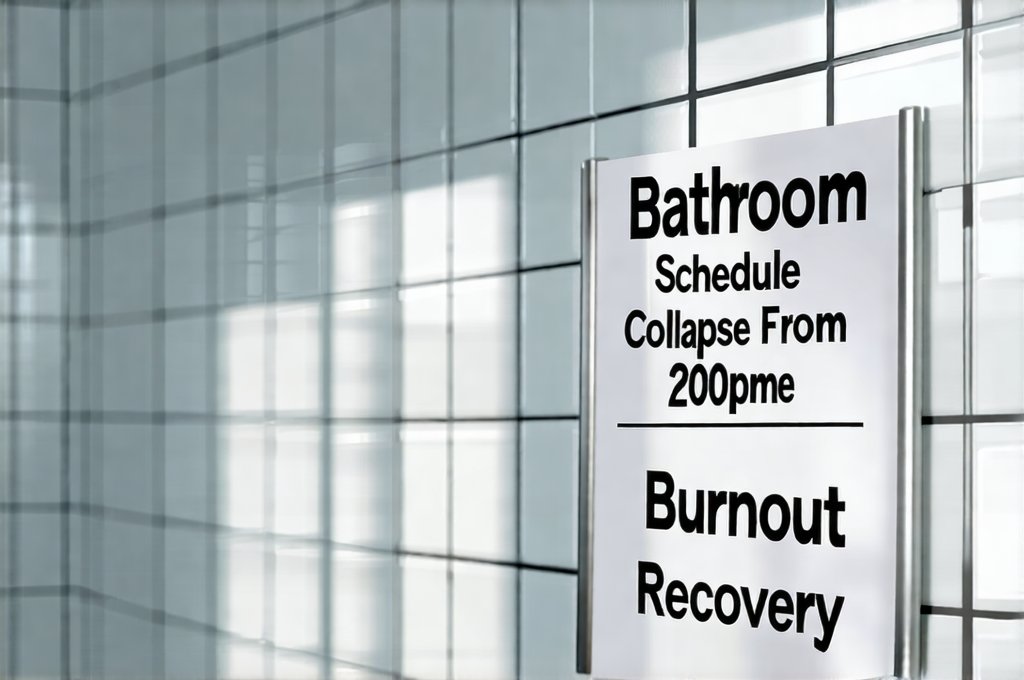Burnout isn’t a sudden event; it creeps in, slowly eroding your energy reserves until even the simplest tasks feel monumental. Often, the first areas to suffer are those routines we take for granted – the “automatic” parts of our day that require minimal conscious thought. For many, this starts with personal care, and specifically, the bathroom schedule. What begins as a slight reduction in effort—skipping a shower one day, letting teeth-brushing slide—can quickly spiral into complete collapse. This isn’t laziness or lack of discipline; it’s a symptom of profound exhaustion, a signal from your body that something needs to change. It signifies a depletion so deep that even maintaining basic hygiene feels impossible, and attempting to do so only adds to the overwhelming burden.
This article delves into the phenomenon of bathroom schedule collapse as a key indicator of burnout recovery needing attention. We’ll explore why this happens, what it looks like beyond just skipping showers, and most importantly, how to gently rebuild these routines without adding to your stress or triggering further setbacks. It’s about understanding that this isn’t a moral failing but a natural consequence of prolonged strain, and about approaching recovery with compassion, flexibility, and a focus on sustainable change rather than rigid self-discipline. We will move beyond simply “getting back on track” and instead focus on building routines that support wellbeing, not demand further depletion. Understanding how to [markers that track gut recovery after stomach viruses] can also help in recognizing the body’s signals during recovery.
Understanding the Bathroom Schedule Collapse
A bathroom schedule collapse isn’t merely about neglecting hygiene; it’s a multifaceted issue rooted in burnout’s impact on executive function and emotional regulation. When you are deeply burned out, your brain shifts into survival mode. This means resources are directed towards essential functions – staying alive – at the expense of everything else. Tasks that once felt automatic now require significant mental effort, creating a barrier to initiating or completing them. The simple act of showering can become overwhelming because it involves multiple steps: gathering supplies, enduring the temperature change, washing, and drying. Each step feels like an insurmountable hurdle. This isn’t about disliking showers; it’s about lacking the capacity for the effort required.
Beyond executive dysfunction, emotional exhaustion plays a significant role. Burnout often leads to feelings of detachment, hopelessness, and even shame. If self-care routines are associated with feeling inadequate or failing to meet expectations (even self-imposed ones), they become further avoided. The thought of looking in the mirror might trigger negative self-perception, making hygiene rituals feel like a painful reminder of inadequacy. This can create a vicious cycle where avoidance reinforces negative feelings and further diminishes motivation. It’s crucial to recognize that this isn’t about vanity; it’s about the emotional toll burnout takes on self-worth. [Signs from test results that call for diet overhaul] might also be related to these feelings of inadequacy.
Furthermore, consider the impact of decision fatigue. Burnout drains cognitive resources, making even minor decisions feel exhausting. Choosing what shampoo to use, whether to wash your hair or not, or how long to shower can all contribute to overwhelming mental strain. This seemingly trivial decision-making becomes another burden on already depleted reserves, leading to inaction and further schedule collapse. It’s why simplifying routines – reducing the number of choices required – is so vital in recovery. The goal isn’t perfection; it’s minimizing cognitive load. [Building a timeline of gut recovery through testing] can help you understand these patterns as well.
Reclaiming Routine: Gentle Steps Forward
Rebuilding a bathroom schedule after a collapse requires a radically different approach than simply imposing strict rules or deadlines. It demands self-compassion and a focus on small, achievable steps. Trying to jump back into your pre-burnout routine is almost guaranteed to fail and will likely exacerbate feelings of inadequacy and overwhelm. Instead, begin with the absolute minimum required for basic health and hygiene, focusing on what feels least burdensome. This might mean:
- Washing your face and brushing your teeth only when you feel capable.
- Using dry shampoo instead of washing your hair immediately.
- Taking a quick sponge bath instead of a full shower.
- Choosing unscented products to reduce sensory overload.
The key is to remove pressure and focus on consistency over thoroughness. Even completing one small step consistently is a victory, reinforcing the idea that you can engage in self-care without being overwhelmed. This isn’t about lowering standards; it’s about acknowledging your current capacity and working within those limitations. It can be helpful to understand [key takeaways from tracking digestive data over time] during this process too.
Next, incorporate micro-habits – tiny actions that require minimal effort but can gradually build momentum. For example, leaving a toothbrush and toothpaste on the counter as a visual reminder or placing a clean towel in the bathroom to encourage showering. These subtle cues reduce friction and make it easier to initiate routines. The goal is to create an environment that supports self-care, rather than one that demands perfection. Remember, progress, not perfection, is the mantra here.
Finally, celebrate small wins. Acknowledge and appreciate every step you take, no matter how insignificant it may seem. This reinforces positive behavior and builds self-efficacy – the belief in your ability to succeed. Reward yourself for consistent effort, even if it’s just taking a few minutes to relax and enjoy a cup of tea after completing a routine. Self-compassion is not indulgence; it’s essential fuel for recovery.
The Role of Sensory Sensitivity
Burnout often heightens sensory sensitivity. What was once tolerable – the smell of strong soap, the texture of certain fabrics, the sound of running water – can now feel overwhelming and distressing. This increased sensitivity can contribute to bathroom schedule collapse because these experiences become aversive, triggering anxiety or even panic. If you find yourself avoiding routines due to sensory overload, it’s crucial to identify your triggers and make adjustments accordingly. [Signs from testing that show gut lining damage] may also be contributing factors.
- Experiment with different products: unscented shampoos, gentle soaps, soft towels.
- Adjust water temperature: avoid extremes of hot or cold.
- Create a calming atmosphere: dim lighting, quiet music, aromatherapy (if tolerated).
- Limit the duration of routines: keep showers short and focused on essential hygiene.
Addressing sensory sensitivity isn’t about eliminating all stimulation; it’s about creating a more tolerable environment. It’s about finding ways to make self-care feel less overwhelming and more soothing. This might involve breaking down routines into smaller, more manageable steps or incorporating mindfulness techniques to manage anxiety.
Detaching from Productivity & Guilt
Burnout is often fueled by the belief that self-care must be “productive” – that every action must have a tangible outcome or contribute to overall efficiency. This mindset can create immense pressure and guilt when routines are neglected, leading to further avoidance. It’s vital to detach from this notion of productivity and recognize that self-care is not about achieving something; it’s about nurturing yourself. Recognizing the need for [gi diagnostics used in recovery from eating disorders] may also help with detaching from productivity.
This requires challenging deeply ingrained beliefs about worthiness and deservingness. Many people with burnout feel they must constantly be doing something to earn their rest or relaxation. They equate self-care with laziness or indulgence, leading to guilt and shame. The reality is that you deserve care and compassion simply for being human – not for what you accomplish or how productive you are.
Cultivating a mindset of radical self-acceptance is essential. This means accepting yourself as you are, flaws and all, without judgment. It means recognizing that setbacks are inevitable and that they don’t diminish your worth. And it means prioritizing your wellbeing above all else – even if that means temporarily letting go of certain routines or expectations. Remember, rest is not a reward; it’s a necessity. Allowing yourself to rest without guilt is a powerful act of self-care and a crucial step in burnout recovery. [Top early signs from stool tests that need follow-up] can also give you insight into your overall wellbeing.


















